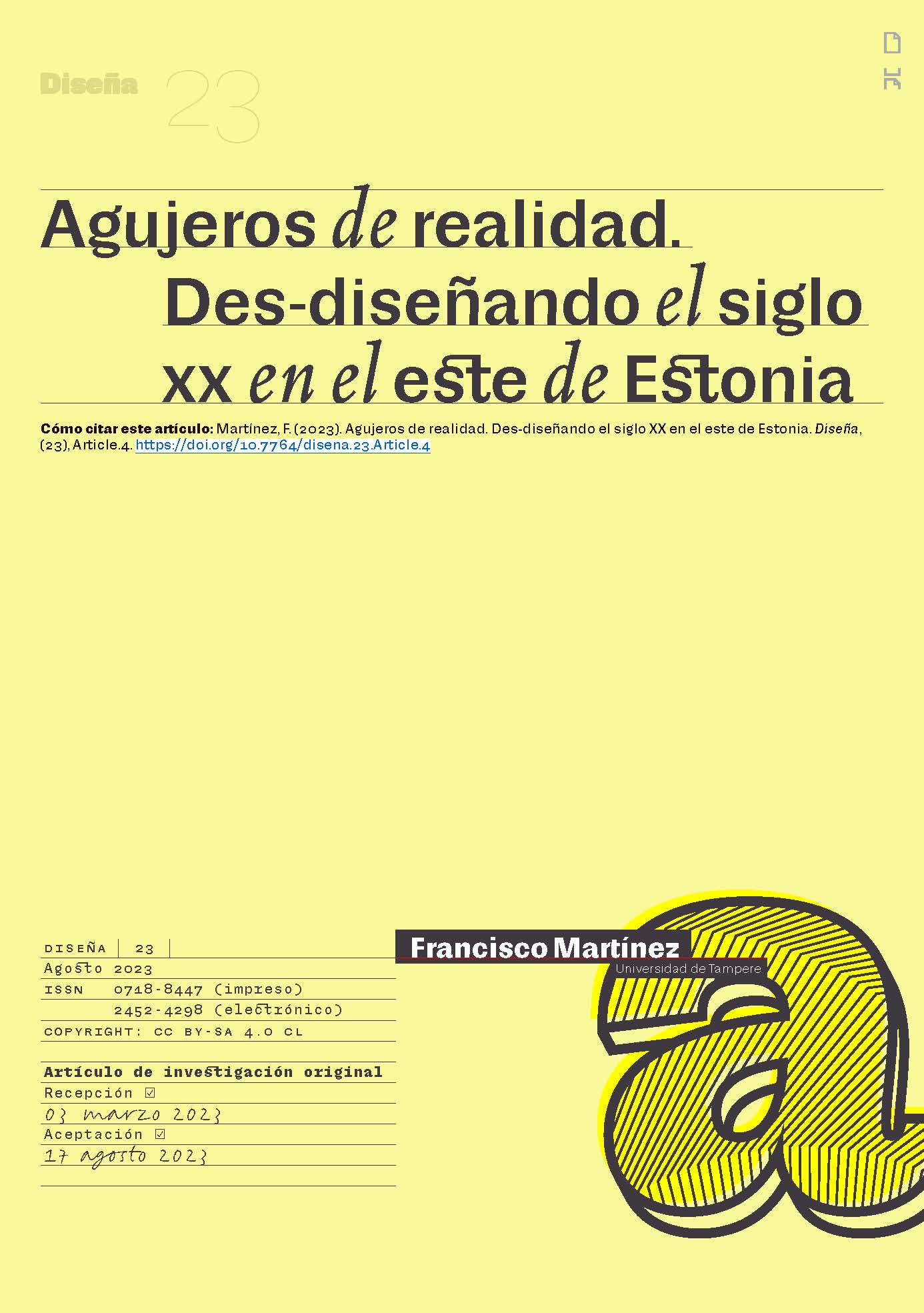Agujeros de realidad. Des-diseñando el siglo XX en el este de Estonia
Contenido principal del artículo
Resumen
A través del estudio de varios agujeros aparecidos en la ciudad minera de Kohtla-Järve, este artículo muestra cómo el trabajo de reparación puede adquirir una carga política al re-poner lo social en orden y materializar diferentes dimensiones de cuidado. En este sentido, la investigación de formas situadas de rotura nos lleva a reconsiderar quién tiene, o debe tener, la responsabilidad de arreglar aquello roto, y cómo la reparación está ligada a cuestiones de futuro y cuidado. La conclusión apunta, primero, a que reparar implica afrontar las consecuencias nocivas de decisiones de diseño pasadas, tiempo después; segundo, a que, al proyectar futuros post-extractivistas, tenemos que afrontar la necesidad de deshacer los elementos perniciosos de la modernidad; y tercero, a que las críticas sobre el coste social y ecológico de la rotura de infraestructuras deben incluir las visiones de la población local.
Detalles del artículo

Esta obra está bajo una licencia internacional Creative Commons Atribución-CompartirIgual 4.0.

Este obra está bajo una licencia de Creative Commons Reconocimiento-CompartirIgual 4.0 Internacional.
NOTA DE COPYRIGHT
Todos los contenidos de esta edición electrónica se distribuyen bajo licencia Creative Commons de “Atribución-Copartirigual 4.0 Internacional” (CC-BY-SA). Cualquier reproducción total o parcial del material deberá citar su procedencia.
Los derechos de las imágenes publicadas pertenecen a sus autores, quienes otorgan a Diseña la licencia para su uso. La gestión de los permisos y la autorización de publicación de las imágenes (o de cualquier material) que contenga derechos de autor y sus consecuentes derechos de reproducción en esta publicación es de exclusiva responsabilidad de los autores de los artículos.
Citas
Bennett, J. (2010). Vibrant Matter: A Political Ecology of Things. Duke University Press.
Callén, B., & Criado, T. S. (2015). Vulnerability Tests. Matters of “Care for Matter” in E-waste Practices. Tecnoscienza: Italian Journal of Science & Technology Studies, 6(2), Article 2.
Carroll, T., Jeevendrampillai, D., Parkhurst, A., & Shackelford, J. (Eds.). (2017). The Material Culture of Failure: When Things Do Wrong. Bloomsbury.
Denis, J., & Pontille, D. (2014). Maintenance Work and the Performativity of Urban Inscriptions: The Case of Paris Subway Signs. Environment and Planning D: Society and Space, 32(3), 404-416. https://doi.org/10.1068/d13007p
Denis, J., & Pontille, D. (2015). Material Ordering and the Care of Things. Science, Technology, & Human Values, 40(3), 338-367. https://doi.org/10.1177/0162243914553129
Dzenovska, D. (2018). Emptiness and its Futures: Staying and Leaving as Tactics of Life in Latvia. Focaal, 2018(80), 16-29. https://doi.org/10.3167/fcl.2018.800102
Dzenovska, D. (2020). Emptiness. Capitalism Without People in the Latvian Countryside. American Ethnologist, 47(1), 10-26. https://doi.org/10.1111/amet.12867
Graham, S., & Thrift, N. (2007). Out of Order: Understanding Repair and Maintenance. Theory, Culture & Society, 24(3), 1-25. https://doi.org/10.1177/0263276407075954
Henke, C. R., & Sims, B. (2020). Repairing Infrastructures: The Maintenance of Materiality and Power. MIT Press.
Jackson, S. J. (2014). Rethinking Repair. In T. Gillespie, P. J. Boczkowski, & K. A. Foot (Eds.), Media Technologies: Essays on Communication, Materiality, and Society (pp. 221-239). MIT Press. https://doi.org/10.7551/mitpress/9042.003.0015
Latour, B. (2005). Reassembling the Social: An Introduction to Actor-Network-Theory. Oxford University Press.
Marres, N. (2012). Material Participation: Technology, the Environment and Everyday Publics. Palgrave Macmillan.
Martínez, F. (2019a). Insiders’ Manual to Breakdown. In F. Martínez & P. Laviolette (Eds.), Repair, Brokenness, Breakthrough: Ethnographic Responses (pp. 1-16). Berghahn.
Martínez, F. (2019b). What Is in a Hole? Voids out of Place and Politics below the State in Georgia. In F. Martínez & P. Laviolette (Eds.), Repair, Brokenness, Breakthrough: Ethnographic Responses (pp. 121-144). Berghahn.
Martínez, F. (2020). Politics of Recuperation: Repair and Recovery in Post-crisis Portugal. Bloomsbury.
Martínez, F. (2023). From Repair to Post-brokenness: Horizontal Materialisations in Estonia and Portugal. Etnográfica (in press).
Martínez, F., & Agu, M. (2021). Postcards from the Edge: Territorial Sacrifice and Care in Eastern Estonia. Roadsides, 5. https://doi.org/10.26034/roadsides-202100510
Martínez, F., & Laviolette, P. (Eds.). (2019). Repair, Brokenness, Breakthrough: Ethnographic Responses. Berghahn.
Mol, A. (2008). The Logic of Care: Health and the Problem of Patient Choice. Routledge.
Tironi, M., & Rodríguez Giralt, I. (2017). Healing, Knowing, Enduring: Care and Politics in Damaged Worlds. The Sociological Review Monographs, 65(2), 89-109. https://doi.org/10.1177/0081176917712874
Tronto, J. (1993). Moral Boundaries: A Political Argument for an Ethic of Care. Routledge.
Ureta, S. (2014). Normalizing Transantiago: On the Challenges (and Limits) of Repairing Infrastructures. Social Studies of Science, 44(3), 368-392. https://doi.org/10.1177/0306312714523855

